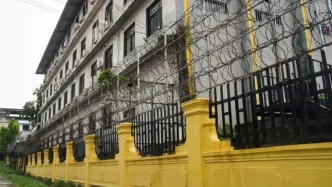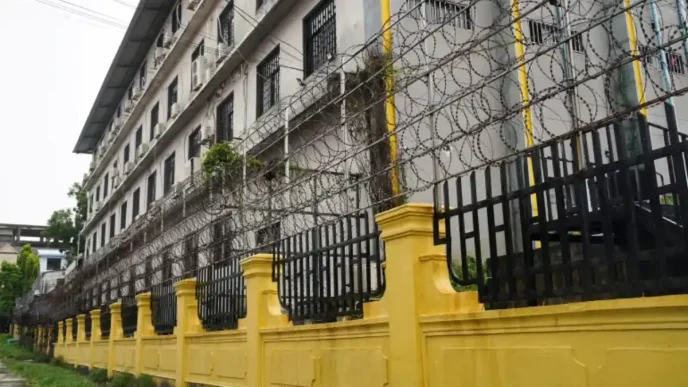In a scene that few could have imagined just months ago, former Philippine President Rodrigo Duterte, once a defiant strongman who openly mocked international justice, now finds himself at the centre of proceedings at the International Criminal Court (ICC) in The Hague. Appearing via video link, dressed in a formal suit but stripped of his characteristic bravado, Duterte seemed a shadow of the firebrand leader who once dominated Philippine politics. His frailty was evident as he struggled to answer even basic questions about his identity and background, a stark contrast to the bombastic rhetoric that defined his presidency.
Outside the ICC, a small group of protestors gathered, some clutching posters of Duterte, rallying in support of his detention. The image, captured by AFP, encapsulates the polarising legacy of a man whose six-year tenure was marked by a brutal drug war, allegations of human rights abuses, and a political style that blended populist appeal with ruthless governance. For many Filipinos, particularly the families of those killed in the drug war, Duterte’s appearance before the ICC represents a long-overdue moment of accountability. For others, especially his loyal base in Mindanao, it is a perceived injustice orchestrated by political enemies.
From Defiance to Detention
Duterte’s journey to The Hague has been a dramatic fall from grace. Just months ago, he dismissed the ICC’s authority with characteristic scorn, and days before his detention, he was rallying supporters in Hong Kong with his trademark bravado. Yet, the man who once dared the world to challenge him now faces allegations of crimes against humanity linked to his administration’s drug war, which saw thousands killed—officially over 6,000 by police, though human rights groups estimate the toll could be as high as 30,000, including at least 122 children by 2022.
The surreal nature of Duterte’s ICC appearance was compounded by the apparent inadequacy of his legal team. Salvador Medialdea, his former executive secretary and de facto defence counsel, struggled to meet the standards of an international court, reduced to reading a statement with little effect. Duterte’s usual theatrics—often a mix of bravado and emotional appeals—found no traction in the sober environment of The Hague. Adding to the irony, Duterte may have to rely on his former spokesperson, Harry Roque, a certified lawyer before the ICC, who recently denied the existence of an arrest warrant. Roque himself, however, faces potential extradition to the Philippines over alleged links to irregular activities in the online gaming sector, casting doubt on his ability to mount a credible defence.
A Web of Missteps and Isolation
Questions abound over how Duterte, who reportedly sought safe haven in China after leaving office, ended up in ICC custody. Speculation suggests he may have been misled by false information or betrayed by incompetent advisors within his inner circle. His decision to leave exile appears to have been a grave miscalculation, leaving him isolated on the international stage. Neither China, which Duterte often praised during his presidency, nor the United States under President Donald Trump, a figure he once called a friend, have shown any inclination to intervene on his behalf.
Domestically, Duterte’s political missteps may have sealed his fate. His rivalry with the Marcos family, a powerhouse in Philippine dynastic politics, likely diminished his influence at home. After initially aligning with President Ferdinand Marcos Jr., tensions flared, leaving Duterte vulnerable. His camp now appears shell-shocked, with some supporters calling for “people power” protests—a throwback to the 1986 movement that ousted Ferdinand Marcos Sr.—though recent attempts to mobilise have drawn only small crowds. Others have floated the idea of a hunger strike until Duterte’s return, though with a trial potentially spanning eight years, such efforts seem more symbolic than practical.
Mindanao and the Narrative of Victimhood
Central to Duterte’s lingering support is his stronghold in Mindanao, the southern island group often referred to as the “Solid South.” Here, Duterte is seen not just as a leader but as a defender against perceived marginalisation by “Imperial Manila,” the political and economic elite based in the capital. His supporters, backed by a network of online trolls, have sought to frame his ICC detention as part of a broader conspiracy against Mindanao, amplifying grievances over historical underdevelopment in the region. Mindanao’s Human Development Index (HDI), a measure of income, life expectancy, and education, lags significantly behind other parts of the Philippines, fuelling a sense of injustice among its residents.
This narrative of victimhood, while rooted in legitimate disparities, risks oversimplifying a complex legacy. Duterte’s presidency promised transformative change for Mindanao, yet critics argue it delivered little beyond rhetoric. Infrastructure projects, including flood control initiatives, were often plagued by delays and allegations of mismanagement. His broader national policies, from a chaotic response to the COVID-19 pandemic to unfulfilled promises of eradicating crime within “three to six months,” have left many Filipinos disillusioned, even among his base.
A Legacy of Violence and Accountability
At the heart of the ICC case is Duterte’s drug war, a policy that defined his presidency from 2016 to 2022. Launched with the aim of purging the Philippines of illegal drugs, it instead became a lightning rod for allegations of extrajudicial killings and human rights abuses. Official figures cite over 6,000 deaths at the hands of police, but independent estimates suggest a far higher toll, with thousands more killed by vigilantes allegedly emboldened by Duterte’s rhetoric. Among the casualties were children, a tragic statistic that has galvanised international outrage and bolstered the ICC’s investigation.
For the families of the victims, Duterte’s detention offers a glimmer of hope for justice, though many remain sceptical. The Philippine justice system, under both Duterte and his successor Marcos Jr., has been slow to address these killings. The Marcos administration has yet to take a clear stance on the ICC proceedings, with some observers suggesting it may be content to let international courts handle the issue rather than confront Duterte’s still-influential base at home.
The Path Forward: Truth and Justice
As the ICC trial unfolds, calls are growing for the Philippines to confront its past more directly. One proposal gaining traction is the rejoining of the ICC by the Philippine Senate, which withdrew from the court in 2019 under Duterte’s orders. Rejoining would signal a commitment to international accountability and could pave the way for greater cooperation with the court. More ambitiously, advocates are pushing for the establishment of a “Truth and Justice Commission” to investigate the drug war’s victims, offering a platform for survivors and families to seek redress.
Such a commission could also address broader systemic issues, from police impunity to the socio-economic conditions that fuel drug abuse and crime. Without it, many fear that the wounds of Duterte’s era will fester, further polarising an already divided nation. The focus, as human rights groups argue, must shift from the spectacle of Duterte’s trial to the lived experiences of those who suffered under his policies—families who lost loved ones, communities terrorised by violence, and a generation scarred by fear.
A Nation at a Crossroads
Rodrigo Duterte’s appearance before the ICC is more than a legal proceeding; it is a reckoning for the Philippines itself. His presidency exposed deep fault lines—between populism and democracy, between regional identities and national unity, and between the promise of security and the reality of violence. Whether his trial will bring closure or further division remains uncertain. What is clear, however, is that the Philippines stands at a crossroads, grappling with how to balance accountability for past wrongs with the urgent need to build a more just future.
For now, the image of Duterte in The Hague, stripped of his bravado and facing the weight of international justice, serves as a potent symbol. It is a reminder that even the most defiant leaders are not above scrutiny, and that the pursuit of justice, however delayed, can eventually find its mark. For the thousands of victims of the drug war, and for a nation seeking to heal, that pursuit is not just a legal matter but a moral imperative.














